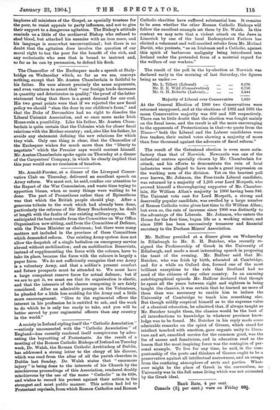The Chancellor of the Exchequer made a speech at Staly-
bridge on Wednesday which, so far as we see, conveys nothing, except that Mr. Austen Chamberlain is faithful to his father. He uses almost precisely the same arguments, and even ventures to assert that "our foreign trade decreases in quantity and deteriorates in quality," the proof of the latter statement being that there is a great demand for our coal. His two great points were that if we rejected the new fiscal policy we should "slam the door in our children's faces," and that the Duke of Devonshire had no right to dissolve the Liberal Unionist Association, and so once more make Irish Home-rule a possibility. Like his father, Mr. Austen Cham- berlain is quite certain that the Colonies wish for closer fiscal relations with the Mother-country; and, also like his father, he avoids any statement defining the new relations for which they wish. Only one thing is clear, that the Chancellor of the Exchequer wishes for much more than the "liberty to negotiate" which the Premier says would content himself. Mr. Austen Chamberlain spoke again on Thursday at a dinner of the Carpenters' Company, in which he clearly implied that this year would see no remission of taxation.










































 Previous page
Previous page